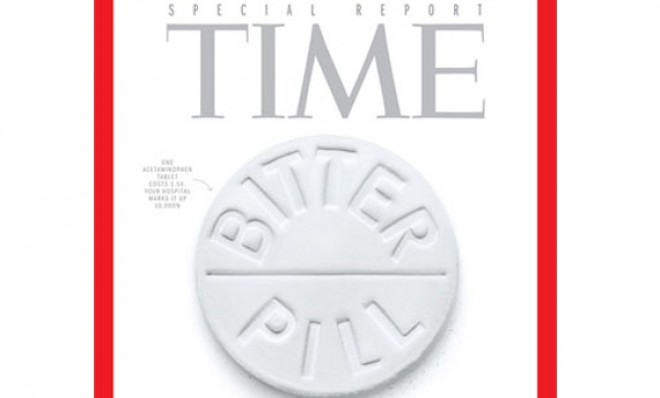10 essential facts about health care


A free daily email with the biggest news stories of the day – and the best features from TheWeek.com
You are now subscribed
Your newsletter sign-up was successful
Steven Brill's magnum opus on health care costs graces the cover of TIME, and it's worth reading in full. But it's also an essay of substantial girth, much like many Americans themselves. I've read the 26,000 word piece a few times — hey, what else is there to do in Los Angeles on a balmy weekend? — and I've summarized the 10 talking points I found most fascinating. Brill's piece is liberal in the classic sense, and broadly sympathetic to ObamaCare, but it is by no means a down-the-line defense of the Democratic Party's interventions in health care. In fact, Brill recommends quite succinctly that the Democrats need to declamp from the teat of trial lawyers.
1. The only thing approximating a market in health care is Medicare, in the sense that the prices it bills for procedures and exams are set by a formula that is somewhat based on what these instruments of health care actually cost. In no way is the private insurance market analogous because hospitals and doctors have much more leverage to set prices. For everyone not covered by Medicare, health care is a seller's market. Customers generally have little choice within their insurance plans of which hospital to go to given consolidation and price-reducing deals that insurance companies make with hospital companies.
2. Hospitals use a document called a chargemaster to set prices. The inputs to the chargemaster are mysterious; hospitals are reluctant to talk about it. It varies considerably, and it often bears no relation to cost. Medicare patients and people with expensive private insurance plans often get discounts off of these prices, but those without health insurance or with cheap insurance plans do not.
The Week
Escape your echo chamber. Get the facts behind the news, plus analysis from multiple perspectives.

Sign up for The Week's Free Newsletters
From our morning news briefing to a weekly Good News Newsletter, get the best of The Week delivered directly to your inbox.
From our morning news briefing to a weekly Good News Newsletter, get the best of The Week delivered directly to your inbox.
3. Non-profit hospitals often make more profit than for-profit hospitals. As much as doctors and hospitals complain about Medicare, they don't avail themselves of the opportunity to not accept patients (in non-emergency situations) with Medicare as their primary insurance plan. This is probably because Medicare payments are sufficiently profitable — just not exorbitantly profitable. (Smaller medical practices are an exception, especially if they charge significantly larger amounts of money for certain services to folks not covered by Medicare.)
4. Insurers have little power to negotiate with hospitals because hospitals are increasingly buying the competition, which has adverse effects on everything from patient outcomes to customer satisfaction, not to mention a driver of price increases.
5. Health care equipment like CT scanners often pay for themselves very, very quickly, and hospitals and doctors have an incentive to buy more of them. The more they buy, the more they are used, the more people are screened by tests they don't need. Selling stuff to hospitals is "one of the brought spots" of the U.S. economy. Defensive medicine drives up demand for tests, too.
6. Hospitals usually wind up taking in about 35 percent of what they bill — and still make profits because the chargemaster prices are so "exorbitant," Brill says.
A free daily email with the biggest news stories of the day – and the best features from TheWeek.com
7. Even if health care consumers do know the price of things in advance, there is almost no price sensitivity of the category of services provided. It is as if humans intuitively do not and will not (and should not) behave as their choices have an effect on prices and quality.
8. There is almost no transparency in the system; non-profits don't have to post their chargemaster rates, and hospitals often explicitly include clauses in their contracts with equipment manufacturers to prevent disclosure of the price they paid for something. Lab work — both in-house and exported — bill in ways that defy transparency.
9. Medicaid covers more people than Medicare, and yet its rules and coverage are much more limited and much spottier. (Brill surmises this is because, unlike seniors covered by Medicare, the poor Americans covered by Medicaid have no reliable political organization to advance their collective interests.)
10. Many insurance plans now have life-time payout limits. Many basic insurance plans cover basically nothing beyond a few very basic basics. ObamaCare gets rid of these, but that means that premiums for everyone with insurance will increase because insurers will not be able to mitigate their risk as much.
Marc Ambinder is TheWeek.com's editor-at-large. He is the author, with D.B. Grady, of The Command and Deep State: Inside the Government Secrecy Industry. Marc is also a contributing editor for The Atlantic and GQ. Formerly, he served as White House correspondent for National Journal, chief political consultant for CBS News, and politics editor at The Atlantic. Marc is a 2001 graduate of Harvard. He is married to Michael Park, a corporate strategy consultant, and lives in Los Angeles.
-
 Why are election experts taking Trump’s midterm threats seriously?
Why are election experts taking Trump’s midterm threats seriously?IN THE SPOTLIGHT As the president muses about polling place deployments and a centralized electoral system aimed at one-party control, lawmakers are taking this administration at its word
-
 ‘Restaurateurs have become millionaires’
‘Restaurateurs have become millionaires’Instant Opinion Opinion, comment and editorials of the day
-
 Earth is rapidly approaching a ‘hothouse’ trajectory of warming
Earth is rapidly approaching a ‘hothouse’ trajectory of warmingThe explainer It may become impossible to fix
